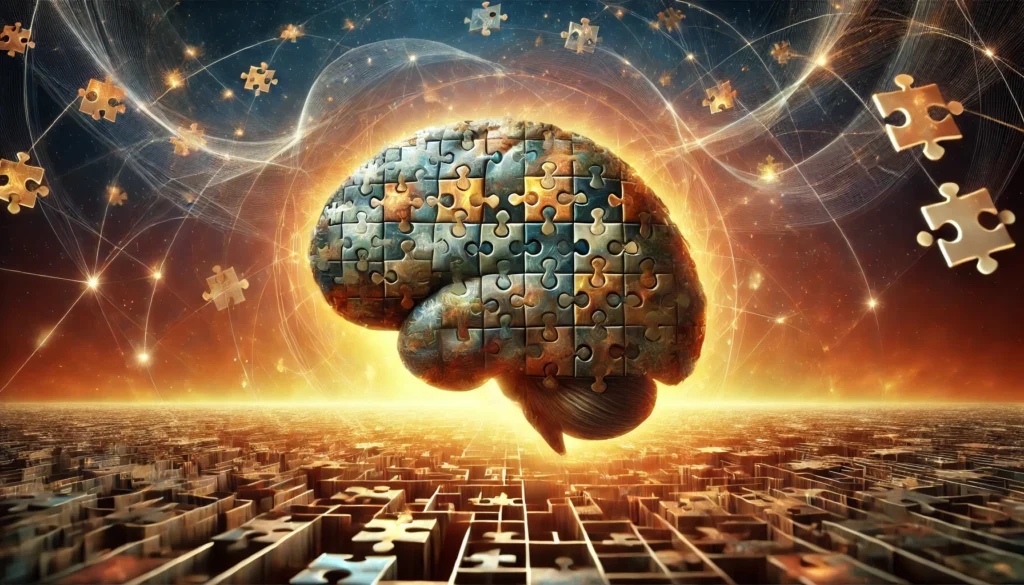To understand why cognitive puzzles are beneficial, we must delve into the realm of neuroscience. The brain, much like a muscle, requires regular exercise to maintain its vitality and functionality. Engaging in cognitive puzzles stimulates neural activity, promoting the growth of new neural connections. This process, known as neuroplasticity, is essential for maintaining cognitive health.
You may also like: Boost Your Mind: Top Brain Games
The Mechanisms of Neuroplasticity
Neuroplasticity refers to the brain’s ability to reorganize itself by forming new neural connections throughout life. This capability is crucial for learning, memory, and overall cognitive function. Cognitive puzzles challenge the brain, prompting it to adapt and grow stronger. When you solve puzzles, you engage various cognitive processes such as problem-solving, spatial reasoning, and memory recall, all of which contribute to enhanced neuroplasticity.
Cognitive Processes Engaged by Puzzles
Puzzles stimulate multiple cognitive domains simultaneously. When solving a crossword, you activate verbal fluency, memory recall, and pattern recognition. Sudoku stimulates numerical understanding and logical reasoning. These activities require the brain to engage in deep thinking and analysis, which enhances neural connectivity and cognitive flexibility.
Long-term Benefits of Brain Engagement
Regular engagement in cognitive puzzles is associated with long-term cognitive benefits. Studies suggest that individuals who routinely challenge their brains with puzzles may have a reduced risk of cognitive decline associated with aging. This continuous mental stimulation builds a cognitive reserve, potentially delaying the onset of dementia and other cognitive impairments.
Cognitive Puzzles for Adults: A Path to Mental Agility
While cognitive puzzles are beneficial for all ages, they hold particular significance for adults. As we age, our cognitive faculties naturally decline, making it imperative to find ways to keep the mind sharp. Cognitive puzzles offer a practical and enjoyable solution.
Memory and Recall Enhancement
Memory decline is a common concern among adults, but cognitive puzzles can help mitigate this issue. Activities such as crossword puzzles and memory games require you to retrieve information, reinforcing neural pathways associated with recall. Regular engagement with these puzzles can enhance memory retention and retrieval, making everyday tasks easier to manage.
- Crossword Puzzles: These puzzles demand the recall of vocabulary and general knowledge, strengthening verbal memory and increasing linguistic skills. Regular practice with crosswords can lead to improved word retrieval and comprehension.
- Memory Games: Games that challenge your memory, like matching pairs or sequence repetition, enhance short-term memory and the ability to remember sequences of information. These games can be particularly beneficial in improving everyday memory tasks, such as remembering names or appointments.

Problem-Solving and Critical Thinking
Cognitive puzzles are inherently problem-solving activities. Whether you’re navigating the logic of a Sudoku puzzle or piecing together a jigsaw, you’re actively engaging your brain’s problem-solving capabilities. This not only improves your ability to think critically but also enhances your capacity to approach complex problems with creativity and confidence.
- Sudoku: Solving Sudoku requires logical thinking and pattern recognition. It trains you to identify patterns, make decisions, and think ahead. These skills translate into better decision-making abilities in real-world scenarios.
- Jigsaw Puzzles: These puzzles improve spatial reasoning by requiring you to visualize how pieces fit together. The ability to manipulate shapes and understand spatial relationships is crucial in fields such as engineering and architecture.
- Logic Puzzles: Engaging in logic puzzles sharpens reasoning skills and enhances your ability to deduce information from given clues. These skills are invaluable for strategic planning and analytical tasks in professional environments.
Stress Reduction and Relaxation
In addition to their cognitive benefits, puzzles offer a form of stress relief. The act of focusing on a puzzle can be meditative, allowing you to escape the pressures of daily life. This mental break can reduce stress levels, improve mood, and contribute to overall mental well-being.
- Mindfulness through Puzzles: The focused attention required to solve puzzles can induce a state of mindfulness. This can help alleviate stress and anxiety, promoting a sense of calm and relaxation.
- Escaping Digital Overload: Engaging in physical puzzles provides a break from digital screens, reducing eye strain and mental fatigue. This digital detox is essential in today’s technology-saturated world.
- Endorphin Release: Successfully solving a puzzle provides a sense of accomplishment, releasing endorphins that enhance mood and foster a positive outlook.
Neurocognitive Puzzles: The Future of Brain Health
As interest in cognitive health grows, so does the development of neurocognitive puzzles. These puzzles are designed with specific cognitive goals in mind, utilizing cutting-edge neuroscience to target areas such as memory, attention, and reasoning.
Personalized Cognitive Training
Neurocognitive puzzles often come in digital formats, allowing for personalized cognitive training. These platforms can adapt to your performance, offering challenges that are tailored to your current cognitive abilities. This personalization ensures that you are continually challenged, maximizing the cognitive benefits.
- Adaptive Algorithms: These puzzles use sophisticated algorithms to adjust difficulty levels based on user performance. This ensures that users are neither bored with simplicity nor overwhelmed by complexity.
- Targeted Cognitive Goals: Personalized puzzles can focus on specific areas of cognitive improvement, such as enhancing attention span or improving working memory. This targeted approach maximizes the efficiency of cognitive training.
- Feedback and Progress Tracking: Many digital platforms offer real-time feedback and progress tracking, allowing users to monitor their cognitive development. This feature provides motivation and helps identify areas that need further improvement.
The Role of Technology
Technology plays a crucial role in the evolution of cognitive puzzles. Mobile apps and online platforms provide easy access to a vast array of puzzles, making it convenient to incorporate cognitive training into your daily routine. These digital tools often include analytics that track your progress, offering insights into your cognitive development over time.
- Accessibility and Convenience: With mobile apps, puzzles are readily available, making it easy to fit cognitive training into busy schedules. You can engage with puzzles during commutes, breaks, or while waiting in line.
- Diverse Puzzle Selection: Online platforms offer a wide range of puzzles, from classic crosswords to innovative brain games. This diversity allows users to explore different types of cognitive challenges.
- Community and Social Engagement: Many digital platforms incorporate social features, enabling users to connect with others, share progress, and compete in puzzle challenges. This social interaction can enhance motivation and foster a sense of community.

Practical Advice for Incorporating Cognitive Puzzles into Your Routine
For those looking to harness the benefits of cognitive puzzles, consistency is key. Here are some practical tips for incorporating puzzles into your daily life:
1. Start Small: Begin with puzzles that match your current cognitive level. As you improve, gradually increase the complexity of the puzzles to continually challenge your brain.
- Beginner-Friendly Options: Choose puzzles like simple crosswords or beginner-level Sudoku to build confidence and establish a routine.
- Gradual Progression: Increase difficulty over time by tackling more complex puzzles, ensuring continuous cognitive growth and engagement.
- Set Achievable Goals: Set small, attainable goals to measure progress and maintain motivation.
2. Diversify Your Puzzles: Engage with a variety of puzzles to stimulate different cognitive processes. This could include crosswords, Sudoku, logic puzzles, and memory games.
- Explore Different Formats: Try both digital and physical puzzles to vary the experience and challenge.
- Incorporate Group Puzzles: Engage in puzzles with family or friends for a social cognitive workout that enhances teamwork and communication skills.
- Rotate Puzzle Types: Regularly switch between different puzzle types to prevent monotony and exercise different cognitive skills.
3. Set a Routine: Dedicate a specific time each day to work on puzzles. This could be during your morning routine, on your lunch break, or before bed.
- Establish a Habit: Consistency is key; aim for daily or weekly puzzle sessions to make cognitive training a regular part of your life.
- Create a Comfortable Environment: Choose a quiet, distraction-free space to maximize focus and enjoyment during puzzle time.
- Incorporate Puzzles into Relaxation: Use puzzles as a form of relaxation and stress relief after a long day, promoting mental well-being.
4. Track Your Progress: Use digital platforms to monitor your cognitive development. This can provide motivation and highlight areas for improvement.
- Utilize Analytics: Leverage app features that track performance metrics to understand strengths and weaknesses.
- Celebrate Milestones: Recognize and reward progress to maintain enthusiasm and commitment to cognitive training.
- Adjust Strategies: Use insights from progress tracking to adjust puzzle strategies and focus on areas needing improvement.

Conclusion
Cognitive puzzles are a powerful tool for unlocking the mind and enhancing cognitive health. By engaging in these activities regularly, you can improve memory, boost problem-solving skills, and reduce stress. As the field of cognitive science continues to evolve, the potential of cognitive puzzles to support mental agility and overall well-being is boundless. Embrace the challenge, and watch your mind flourish. The journey to cognitive enhancement through puzzles is not only beneficial but also enjoyable, providing a fulfilling path to lifelong mental fitness.
Further Reading:
10 ways fun brain puzzles help to improve cognitive health
7 Top Puzzles and Games for Cognition and Learning for Seniors
Important Note: The information contained in this article is for general informational purposes only, and should not be construed as health or medical advice, nor is it intended to diagnose, prevent, treat, or cure any disease or health condition. Before embarking on any diet, fitness regimen, or program of nutritional supplementation, it is advisable to consult your healthcare professional in order to determine its safety and probable efficacy in terms of your individual state of health.
Regarding Nutritional Supplements Or Other Non-Prescription Health Products: If any nutritional supplements or other non-prescription health products are mentioned in the foregoing article, any claims or statements made about them have not been evaluated by the U.S. Food and Drug Administration, and such nutritional supplements or other health products are not intended to diagnose, treat, cure, or prevent any disease.


